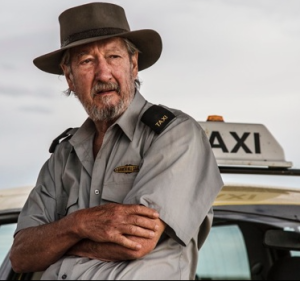
SteveMcCabe.net...
...being the online presence of Steve McCabe himself
On Last Cab To Darwin, and the joy of simple, beautiful films
August 24th, 2015The two hours of Last Cab To Darwin contain about an hour and a half of an excellent, moving, sweet and lovely film, and a good half-hour of unnecessary, heavy-handedly political posturing.
Based on a stage play written by Reg Cribb, who also has a writing credit here, the film follows Rex, a taxi driver from Broken Hill in New South Wales. Rex has terminal cancer, and, with his doctors telling him he has only three months left, he hears of a doctor in Darwin who is leading the campaign for doctor-assisted suicide. The Northern Territory government has passed legislation legalising the practice, and so Rex embarks on a three-thousand-and-some-kilometer drive to Darwin to enlist the doc’s services in ending his life.
And it’s a lovely, sweet film. Reg, played with quiet dignity by Michael Caton, is old, and tired — “These days, I can’t even remember being young.” He quite clearly adores his neighbour, Polly (Ningali Lawford-Wolf), but won’t let anyone see him holding her hand as they sit on his front porch drinking their morning cup of tea together — racial politics in Broken Hill clearly aren’t quite ready for a white man being that close to a blackfella woman. Along the way to Darwin, Rex finds himself, through moderately contrived plot developments, accompanied from Oodnadatta by Tilly, a young Aboriginal man who, almost to the point of cliché, is a rough diamond, a flawed character with a heart of gold and from Daly Waters by Julie, a nurse from England. He reaches Darwin and meets Dr. Farmer, played by a rather one-dimensional Jacki Weaver.
Along the way, the film, beautifully directed by Jeremy Sims with a , navigates its way through the red centre of Australia, and, with less success, through the country’s racial complexities. While it portrays Rex as a complex, deep, rich character, Tilly (Mark Coles Smith) is something of a cypher, an unreliable, untrustworthy, but charming and loveable, rogue, an Aborigine in need of redemption by a white man, which is, of course, precisely what Rex takes it upon himself to do. Last Cab To Darwin is a truly touching, wonderful film of a man facing a painful decision in seeming isolation and with dark but genuine humour, and on that level it works magnificently. Caton is superb as an old man who believes he has nothing left worth fighting through his cancer’s pain for; Lawford-Wolf is as angry at being hidden as she is devoted to Rex.
Had Last Cab To Darwin simply dealt with Rex, it would have been a thoroughly wonderful film, one that handles a messy, complicated topic with intelligence, and would have lasted about half an hour less. But it picks up an extra half-hour as Rex meets, and then tries to save, Tilly, in a storyline that is quite unnecessary and whose omission would have made for a much stronger film. Rex’s relationship with Polly, as interracially transgressive as it is, would be enough to make the film’s point — Rex, from his record player to his reliance on payphone, is resolutely a product of the 1970s, but his fondness for Polly is strong enough to overcome outdated 1970s racial prejudices, without needing to bludgeon the audience with its politics. Tilly, on the other hand, is a black man who needs a white man to redeem him, who can only succeed if a whitefella speaks up for him.
For all its flaws — and it has, let’s be fair, one rather large one, Last Cab To Darwin is a lovely, sweet, human story, filled, for the most part, with genuine, believable, honest characters. So far it has limited release outside Australia, but it’s worth looking for, a truly enjoyable film.

Leave a Reply